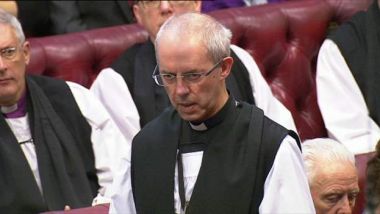Church of England paid bonuses of £1million to ten of its own fund managers, figures reveal

The Church of England paid more than £1million in bonuses to ten of its own fund managers last year, newly released financial statements have revealed.
The CofE's financial wing, the Church Commissioners, has produced an annual report showing that in 2016 the bonuses, which were first paid to managers in 2013, topped the £1 million level for the first time.
The figures show that in 2016 the ten managers received total bonuses of £1,048,000, during a year in which the Commissioners earned a market-beating 17.1 per cent on the CofE's historic investments.
As a result, the value of the Church's holdings rose to almost £8 billion, and allowed the Commissioners to inject more than £230 million into the Church to pay its costs and clergy stipends.
A spokesperson for the Church Commissioners said: 'In order to be able to fulfil our obligations towards the mission of the Church of England, we need to attract and retain experienced and qualified staff. This year's return of 17.1 per cent is well ahead of our target of inflation +5 per cent, and would not have been possible if we were not able to attract excellent staff. We are in line with our own policies on executive pay, as our report highlights.
'During 2016 the highest paid member of staff earned 11.5 times the salary... received by the lowest paid member of staff, and 6.8 times the median salary. This is consistent with the recommendations on company remuneration adopted by the NIBs on the advice of the EIAG (Ethical Investment Advisory Group) in 2013.'
The Archbishop of Canterbury, Justin Welby said: 'In a year which saw considerable political turbulence, the Church Commissioners continued to provide effective stewardship of investments matched by ethical and responsible investment.'
A critical report in the Daily Mail contrasted Welby's approach with his condemnation of the bonus culture in 2013, when he was a member of the Parliamentary Commission on Banking Standards, which was investigating City practices.
Then, the Archbishop told HSBC executives that their bonus payments were unnecessary. 'I am increasingly baffled at the discussion we are having,' Welby said at the time. 'What is it essentially about bankers that means they need skin in the game? We don't give skin in the game to civil servants, to surgeons, to teachers. There's a whole range of people who don't have that. It seems to me that you are putting huge effort into a values-based organisation and yet at the end of the day, particularly for your most senior staff who are most important as regards setting values and culture, you seem to be saying the only way you can motivate them to any significant extent is with cash.'
The Mail quoted Ruth Lea, an economist for the Arbuthnot Banking Group and a practising Anglican, as saying: 'The Church needs to rethink the consistency of its messages. There seems to be some inconsistency here which some people might see as hypocrisy. At the very least there should be consistency between what they say and what they do. People expect the Church to say what it means and mean what it says.'
The biggest bonus went to the investment chief Tom Joy, who was given a 'long term incentive payment' of £202,000 on top of his salary of £259,000, taking his earnings for the year up to £461,000. Joy's total bonuses from 2013 to 2016 have now totalled £661,000.











